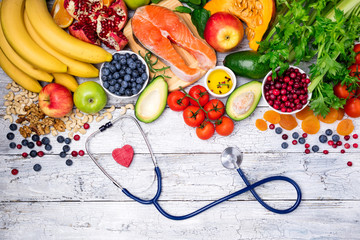
Millions of individuals throughout the world suffer from the chronic illness known as diabetes. While genetics and lifestyle choices have an impact on how it develops, nutrition is a crucial element that cannot be overlooked. “What foods cause diabetes?” is a common question. This essay will go into this issue and examine the connection between diet and the chance of developing diabetes.
Understanding Diabetes
Before we explore the specific foods that may contribute to diabetes, let’s briefly understand the two primary types of diabetes:
- Type 1 Diabetes: This type is primarily genetic and not related to diet. It occurs when the immune system mistakenly attacks and destroys insulin-producing beta cells in the pancreas, leading to a lifelong dependency on insulin.
- Type 2 Diabetes: The most common form, type 2 diabetes, is closely linked to lifestyle factors, including diet. It usually develops in adulthood but is increasingly seen in younger individuals due to rising obesity rates.

Foods Cause Diabetes
While there is no single “diabetes-causing” food, several dietary choices can increase the risk of developing type 2 diabetes. Here are some key culprits:
- Sugary Beverages: Regular consumption of sugary sodas, fruit juices, and energy drinks can lead to weight gain and insulin resistance, a hallmark of type 2 diabetes. Opt for water, herbal tea, or sugar-free alternatives.
- Processed Foods: Highly processed foods, rich in refined carbohydrates and unhealthy fats, can disrupt blood sugar control. This includes sugary cereals, packaged snacks, and fast food.
- Red and Processed Meats: A diet high in red and processed meats, such as bacon, sausages, and hot dogs, has been linked to an increased risk of type 2 diabetes. Consider leaner protein sources like poultry, fish, and plant-based options.
- White Rice and White Bread: Foods with a high glycemic index, like white rice and white bread, can cause rapid spikes in blood sugar levels. Opt for whole grains, such as brown rice and whole wheat bread, for better blood sugar control.
- Sweets and Desserts: Excessive consumption of sweets, cakes, cookies, and ice cream can contribute to weight gain and insulin resistance. Moderation is key when indulging in these treats.
- Unhealthy Fats: Trans fats and saturated fats found in fried foods and certain margarines have been associated with an increased risk of type 2 diabetes. Choose healthier fats like those found in nuts, seeds, and olive oil.
Conclusion
While it’s vital to be aware of the foods listed above, it’s also necessary to stress the importance of a balanced diet, regular exercise, and maintaining a healthy weight in order to lower the risk of type 2 diabetes. Make an effort to construct a diet high in fruits, vegetables, whole grains, and lean proteins rather than concentrating primarily on what foods cause diabetes.
Remember that controlling diabetes involves making healthier choices generally to promote your long-term wellbeing as well as avoiding certain meals. To develop a customized plan that meets your specific requirements and enables you to lower your risk of developing diabetes or manage the illness if you already have it, speak with a healthcare expert or a qualified dietitian. Make a good diet choice because it can have a big impact on your health journey.
FAQ:
1. What is the relationship between diet and diabetes?
- The relationship between diet and diabetes is significant, especially for type 2 diabetes. Consuming a diet high in unhealthy foods, such as sugary beverages and processed carbohydrates, can increase the risk of developing type 2 diabetes.
2. Can specific foods cause diabetes?
- No single food directly causes diabetes, but certain dietary choices, when made consistently over time, can contribute to the development of type 2 diabetes. These choices include high-sugar and high-fat foods.
3. Are carbohydrates bad for people with diabetes?
- Carbohydrates are not inherently bad, but the type and amount of carbohydrates matter. Whole grains, fruits, and vegetables are healthier carbohydrate choices compared to sugary snacks and white bread. Managing portion sizes and monitoring blood sugar levels is important for people with diabetes.
4. Is there a diabetes-friendly diet I should follow?
- Yes, a diabetes-friendly diet typically includes balanced portions of carbohydrates, lean proteins, and healthy fats. It’s essential to monitor blood sugar levels and consult with a healthcare provider or dietitian to create a personalized meal plan.
5. Can losing weight help prevent or manage diabetes?
- Yes, losing weight through a combination of a healthy diet and regular physical activity can significantly reduce the risk of type 2 diabetes. For those already diagnosed, weight loss can help improve blood sugar control.
6. How can I control my sugar cravings and reduce the risk of diabetes?
- To control sugar cravings and reduce diabetes risk, focus on eating whole, unprocessed foods, and limit sugary snacks and beverages. Include fiber-rich foods in your diet, drink plenty of water, and maintain a regular eating schedule to help control cravings.
